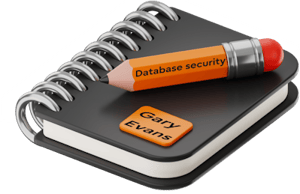Now, before we dive in, a quick heads-up: the titles and exact responsibilities of these roles can vary from one organization to another. But regardless of the names, you'll likely find equivalents in most places. Whether it's a Chief Information Security Officer (CISO), an IT Security Guru, or a Data Protection Maestro, these roles form the backbone of your organization's cybersecurity efforts. In this blog, we'll unravel these roles, focusing on how they intertwine with your responsibilities as a Database Administrator (DBA) to fortify the organization's data defences.

Without further ado, let's get to our cast.
The Chief Information Security Officer (CISO): the strategic leader

Why it matters: The CISO is responsible for the overall security posture of the organization, including policy development, risk management, and ensuring compliance with regulatory requirements. For a DBA, the CISO is a crucial ally. Understanding their vision and strategy for security can help align your database security initiatives with the broader organizational goals. Plus, they're your go-to person for advocating for the resources and tools you need to keep your databases secure.
The IT Security Team: your technological shield

They generally look after things like your firewall, antivirus software, intrusion detection software, and security related protocols to achieve this.
Why it matters: Collaboration with this team ensures that the network layer security complements your database security measures, forming a multi-layered defence strategy.
The Compliance Officer: the regulators

You’re most likely aware of GDPR, and as a DBA are also likely to have been involved in activities related to its compliance.
Why it matters: They help you navigate the complex landscape of compliance, ensuring that your databases don't become a legal liability.
The Cybersecurity Analysts: the intelligence unit

Often, they will monitor sites looking for Common Vulnerabilities and Exposures (CVE’s) that impact the software (including database servers) the organization is running. If a CVE is considered a risk to your database software, obtaining a patch to address it can be a high priority activity.
Why it matters: Their insights can inform your database security strategies, helping you anticipate and prepare for emerging threats.
The Incident Response Team: the firefighters

My team recently detected a minor breach on a test machine in the cloud, and this team made all the difference in providing a rapid and effective response.
Why it matters: Knowing their protocols and having a clear line of communication can significantly reduce the impact of a database breach.
The Application Development Team: the builders

Taking a proactive approach by developing a relationship with the development teams early in the development cycles can pay significant dividends down the track in both proactive and re-active protection strategies.
Why it matters: Collaborating with them can lead to more secure applications, reducing vulnerabilities at the application level.
Conclusion
Beyond the roles I've highlighted, there's a broad array of cybersecurity positions – over 25 at last count, including access administrators, encryption experts, monitoring/alerting specialists, and many more.
The roles I've detailed are crucial within an organization's cybersecurity framework. As a DBA, knowing how to interact with the CISO, IT security team, compliance officers, cybersecurity analysts, the incident response team, and application developers is key to enhancing your database's security.
In upcoming articles, I'll delve into the specifics of each role and explore how they contribute to effective database security strategies in the modern business landscape.
Next on this series
 Another aspect of database security that deserves our full attention is security benchmarking. This involves measuring and evaluating the effectiveness of security controls and practices within an organization, and will be the topic of my next blog post in this series.
Another aspect of database security that deserves our full attention is security benchmarking. This involves measuring and evaluating the effectiveness of security controls and practices within an organization, and will be the topic of my next blog post in this series.
Stay tuned and don't forget to subscribe to be notified of new posts. Let's make our databases not just storage units, but fortresses!


 Hey there, database defenders!
Hey there, database defenders! 


